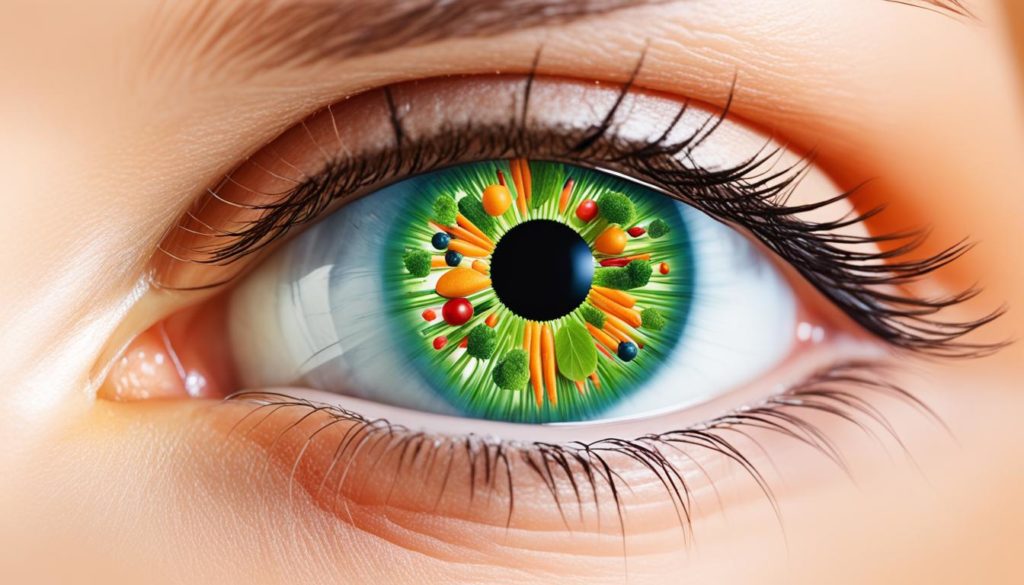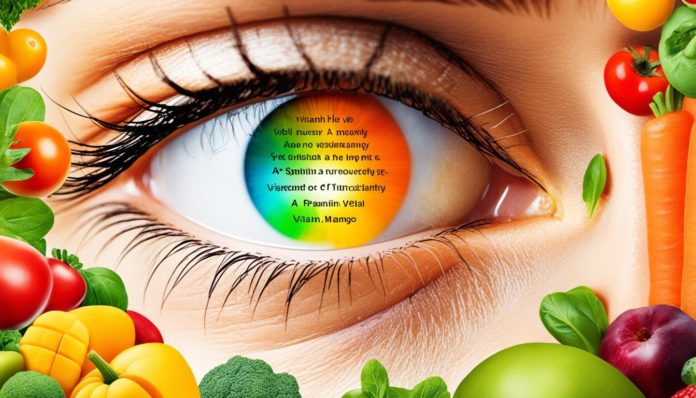Vitamin A is key for keeping your eye health in top shape. It comes in forms like retinol and carotenoids. These help a lot with visual function, especially when it’s dark.
It’s not just for your eyes, though. Vitamin A is also important for your skin and mucous membranes. This makes it a must-have for staying healthy overall.
Key Takeaways
- Vitamin A is essential for maintaining eye health and visual function.
- This nutrient is available in forms such as retinol and carotenoids.
- It plays a crucial role in low-light vision and the development of ocular tissue.
- Vitamin A also supports the health of skin and mucous membranes.
Introduction to Vitamin A
Vitamin A is a key fat-soluble vitamin vital for our health. It helps with vision, immune function, and skin health. It comes in two main forms: preformed vitamin A and provitamin A.
What is Vitamin A?
Vitamin A, a fat-soluble vitamin, is crucial for many body functions. These include vision, immune responses, and cell communication. You can get it from various dietary sources and it’s needed for normal health.

Types of Vitamin A
There are two main types of Vitamin A:
- Preformed Vitamin A (Retinol): Found in animal products like liver, dairy, and fish.
- Provitamin A (Carotenoids): Found in fruits and vegetables; beta-carotene is the key carotenoid.
Sources of Vitamin A
Knowing where to find Vitamin A is key for getting enough. There are animal products and plant-based foods to consider:
| Animal Products | Plant-Based Foods |
|---|---|
| Liver | Carrots |
| Dairy Products | Spinach |
| Fish | Kale |
A balanced diet with animal products and plant-based foods rich in beta-carotene keeps Vitamin A levels right.
The Role of Vitamin A in Eye Health
Vitamin A is key for keeping our eye health in top shape. It helps with many visual tasks, making sure our vision stays clear and sharp in all kinds of light.
How Vitamin A Supports Vision
Vitamin A is crucial for making rhodopsin, a protein in our eyes. Rhodopsin grabs light in the retina, which is essential for seeing in the dark. Having enough Vitamin A means our retinal health is good and our vision support is strong.

Vitamin A and Night Vision
Not having enough Vitamin A can lead to night blindness. People who don’t get enough of this vitamin may find it hard to see in dim light. Eating enough Vitamin A can help prevent night blindness and keep our vision good in different lighting.
Prevention of Eye Diseases
Getting enough Vitamin A helps prevent eye diseases. Issues like age-related macular degeneration and cataracts are linked to Vitamin A shortages. Eating foods rich in Vitamin A can boost our retinal health and lower the risk of serious eye problems. This supports strong vision support as we age.
Vitamin A and Immune Function
Vitamin A is key to a strong immune system. It keeps the mucous membranes in the respiratory, digestive, and urinary tracts healthy. These membranes are the first line of defense against germs, helping to prevent infections.
Boosting the Immune System
Vitamin A is vital for the immune system. It helps T-cells, a key type of immune cell, work better. This means the immune system can fight off infections more effectively.
Role in Infection Prevention
Vitamin A also helps prevent infections by boosting the immune response in mucous membranes. Keeping these membranes healthy helps stop harmful germs from entering the body. This reduces the risk of getting sick.
Supporting White Blood Cells
White blood cells, especially lymphocytes, need Vitamin A to work right. With enough Vitamin A, the immune system can quickly fight off invaders. This makes the body more resistant to infections.
The Antioxidant Properties of Vitamin A
Vitamin A is known for its strong antioxidant effects. It helps fight oxidative stress. This stress can cause damage from free radicals.
What are Antioxidants?
Antioxidants fight oxidative stress by stopping free radicals. Free radicals are unstable atoms that harm cells. Eating antioxidants like Vitamin A protects your cells from damage.
Vitamin A as an Antioxidant
Vitamin A, especially beta-carotene, is a strong antioxidant. It lowers oxidative stress and shields cells from free radical damage. This is key to staying healthy and avoiding problems linked to oxidative stress.
Benefits of Antioxidants
Eating antioxidants like Vitamin A has many health perks. It lowers the risk of heart disease and some cancers. Plus, it helps protect cells, boosting overall health and lifespan.
Vitamin A for Skin Health
Vitamin A is key for skin health, helping cells grow and multiply. It’s often used in dermatological health to make skin look better, treat acne, and boost the immune system. It comes in both topical and systemic forms.
Enhancing Skin Appearance
Vitamin A helps with skin repair and making skin look younger. It speeds up cell turnover, which lightens dark spots and smooths skin. Using Vitamin A regularly can make skin look brighter and younger, making it a key part of many skincare routines.
Preventing Skin Conditions
Vitamin A is key in stopping skin problems like acne, eczema, and psoriasis. It controls sebum production, which lowers acne. Its anti-inflammatory effects also calm the skin and stop inflammation.
Support in Wound Healing
Vitamin A plays a big role in wound healing, helping repair tissues. It boosts the skin’s immune system, lowers infection risk, and helps healing happen faster. This is great for preventing acne and keeping skin healthy overall.
| Benefit | Description |
|---|---|
| Skin Repair | Accelerates cell turnover and smooths texture, promoting youthful skin. |
| Acne Prevention | Regulates sebum production and reduces acne outbreaks. |
| Dermatological Health | Supports the immune system and aids in wound healing, reducing infection risk. |
Vitamin A in Growth and Development
Vitamin A is key for many health benefits, not just for eyes and immune health. It plays a big part in making cells work right, which is key for growth and keeping tissues healthy.
Role in Cell Growth
Vitamin A is vital for cell growth and making cells different. It helps make epithelial cells, which protect organs. Getting enough Vitamin A helps kids grow strong by making sure cells work right for organs and tissues.
Support for Bone Health
Vitamin A also helps with bone health. It helps make and change bone cells, which is important for bone health. This is crucial for kids, whose bones are always growing. Having enough Vitamin A helps prevent bone problems and growth issues.
Development in Children
For kids, Vitamin A is key for growing and staying healthy. Not having enough can slow growth and make kids more likely to get sick. Doctors stress the need for enough Vitamin A in kids to help with growth and health later on. Vitamin A helps with cell work and bone health, setting kids up for a healthy future.
Natural Sources of Vitamin A
Vitamin A comes from many natural sources. These can be split into two main groups: high-retinol foods and beta-carotene rich foods. These foods are key for keeping Vitamin A levels right. They help with many body functions.
High-retinol foods are from animals and are full of retinol, a Vitamin A type that’s easy for the body to use. Liver is a top source, packed with retinol. Fish, dairy like cheese and butter, and eggs are also high in retinol. These are great for those wanting to boost their Vitamin A.
Then, there are beta-carotene rich foods from plants that turn into Vitamin A in the body. You’ll find them in colorful veggies and fruits like sweet potatoes, carrots, kale, and spinach. Eating these can help get a good Vitamin A balance.
Both types of foods are crucial for staying healthy. Adding them to your meals can stop Vitamin A shortages and keep you feeling good.
Vitamin A Deficiency
Vitamin A deficiency is a big worry, especially in poor areas. It’s key for keeping eyes healthy and boosting the immune system. Without enough vitamin A, health problems can get really bad.
Signs and Symptoms
Spotting vitamin A deficiency early is key. Look out for these signs and symptoms:
- Night blindness
- Dry skin
- Frequent infections
- Slow wound healing
Seeing these signs early can stop things from getting worse. It can prevent serious vision loss or even blindness.
Causes of Deficiency
There are many reasons for vitamin A deficiency, but not getting enough nutrients is a big one. Eating poorly is often the main cause. Some health issues, like celiac disease or chronic diarrhea, can make it worse. Bad eating habits are a big problem everywhere.
Health Risks and Consequences
Being short on vitamin A can lead to big health problems. It can cause eye issues, weaken the immune system, and make you more likely to get sick. For kids and pregnant women, it can even be deadly.
Knowing about these risks helps catch problems early. This can stop serious health issues from happening.
| Condition | Impact |
|---|---|
| Xerophthalmia | Severe vision impairment, potentially leading to blindness |
| Immune Deficiency | Increased susceptibility to infections and diseases |
| Developmental Delays | Growth stunts and increased mortality in children |
Getting enough vitamin A through food is key to avoiding these serious health issues.
Recommended Daily Intake of Vitamin A
It’s key to know how much Vitamin A you need for good health. Health experts give us dietary guidelines to avoid Vitamin A deficiency. These guidelines change based on your age, sex, and life stage.
| Age Group | Male (in mcg RAE/day) | Female (in mcg RAE/day) |
|---|---|---|
| Children 1-3 years | 300 | 300 |
| Children 4-8 years | 400 | 400 |
| Children 9-13 years | 600 | 600 |
| Teens 14-18 years | 900 | 700 |
| Adults 19+ years | 900 | 700 |
| Pregnant Women | – | 750-770 |
| Breastfeeding Women | – | 1,200-1,300 |
These dietary guidelines and nutritional recommendations help you get the right amount of Vitamin A. Following them keeps your vision sharp, your immune system strong, and you feeling great.
Safety and Side Effects of Vitamin A
Vitamin A is key for health, but it’s important to know about its side effects and risks from too much. We’ll look into these issues and give advice on safe supplements to avoid hypervitaminosis A.
Potential Side Effects
Taking too much Vitamin A can cause problems. You might feel dizzy, nauseous, have headaches, or pain. High doses over time can lead to serious issues like liver damage or bone thinning. Always follow healthcare advice for safe Vitamin A intake.
Toxicity Risks
Too much Vitamin A can cause hypervitaminosis A, a serious condition. Symptoms include confusion, double vision, and even liver damage. It’s crucial to not take too much Vitamin A. Always get advice on supplements to keep your intake safe.
Safe Supplementation Tips
Here are tips for safe Vitamin A use:
- Always talk to a healthcare provider before starting Vitamin A supplements.
- Stick to the recommended daily amount to avoid too much Vitamin A.
- Choose supplements from trusted brands with balanced doses.
- Keep track of Vitamin A from food and supplements to stay safe.
- Check in with your healthcare provider to adjust your supplements as needed.
Remember these tips to safely use Vitamin A and avoid its risks. This advice is key to adding Vitamin A to your health routine safely.
Conclusion
Vitamin A is a key nutrient that plays a big role in many health areas. It helps with vision, boosts the immune system, acts as an antioxidant, and keeps skin healthy. It’s also crucial for growth and development, making it a must-have in a balanced diet.
Getting enough Vitamin A is important for good health. Eating foods like vegetables, fruits, and animal products is the best way to get it. For some, supplements can also help meet daily needs, especially if diet is limited.
But, it’s important to be careful with Vitamin A intake. Too much can be harmful. By knowing how much to take, you can enjoy its health benefits. This leads to better health and a more active, happy life.
FAQ
What is Vitamin A?
Vitamin A is a fat-soluble vitamin that keeps us healthy. It’s key for eye health, fighting off infections, keeping skin healthy, and helping cells grow and develop.
What are the types of Vitamin A?
There are two main types of Vitamin A. Preformed vitamin A comes from animal sources like liver and dairy. Provitamin A carotenoids are in fruits and veggies, with beta-carotene being the main one.
What are the sources of Vitamin A?
You can get Vitamin A from animal foods like liver, fish, and dairy. Or from plant foods like carrots, sweet potatoes, kale, and spinach. These plant foods are full of beta-carotene.
How does Vitamin A support vision?
Vitamin A is key for seeing well, especially in the dark. It’s part of a protein that helps the eyes absorb light. This keeps your vision sharp and helps you see at night.
What is the role of Vitamin A in night vision?
Vitamin A is essential for seeing in the dark. It makes a pigment in the eyes that lets us see in low light. Without enough Vitamin A, you might not see well at night.
How does Vitamin A help prevent eye diseases?
Eating enough Vitamin A can stop eye diseases like age-related macular degeneration and cataracts. It keeps the eyes healthy.
How does Vitamin A boost the immune system?
Vitamin A keeps cells lining our airways, digestive tract, and urinary tract strong. This helps fight infections. It also helps make and work better white blood cells like lymphocytes.
What is Vitamin A’s role in infection prevention?
Vitamin A helps prevent infections by keeping cells strong and supporting immune cells. This makes it harder for infections to take hold.
How does Vitamin A support white blood cells?
Vitamin A helps make and work better white blood cells, especially lymphocytes. This boosts the immune system’s fight against germs.
What are antioxidants?
Antioxidants fight oxidative stress by neutralizing free radicals. This protects our cells from damage.
How does Vitamin A act as an antioxidant?
Vitamin A, especially beta-carotene, acts as an antioxidant. It fights free radicals and reduces oxidative stress. This protects cells from harm.
What are the benefits of antioxidants?
Antioxidants protect cells from damage, lower the risk of diseases like heart disease and cancer, and support overall health.
How does Vitamin A enhance skin appearance?
Vitamin A helps make and grow skin cells, making skin look better. It’s also used to treat acne and other skin issues.
How does Vitamin A prevent skin conditions?
Vitamin A supports the skin’s immune system and prevents conditions like psoriasis and eczema. It helps keep skin healthy by promoting cell production and repair.
How does Vitamin A support wound healing?
Vitamin A is key for healing wounds by helping repair tissue and regenerate skin.
What is the role of Vitamin A in cell growth?
Vitamin A is crucial for cell growth and differentiation. It helps develop and maintain healthy tissues and organs.
How does Vitamin A support bone health?
Vitamin A is important for bone metabolism. It helps form and maintain bones, supporting skeletal health.
Why is Vitamin A important for development in children?
Vitamin A is crucial for kids’ growth and development. Not getting enough can lead to growth problems and bone issues. So, kids need enough Vitamin A for good health.


